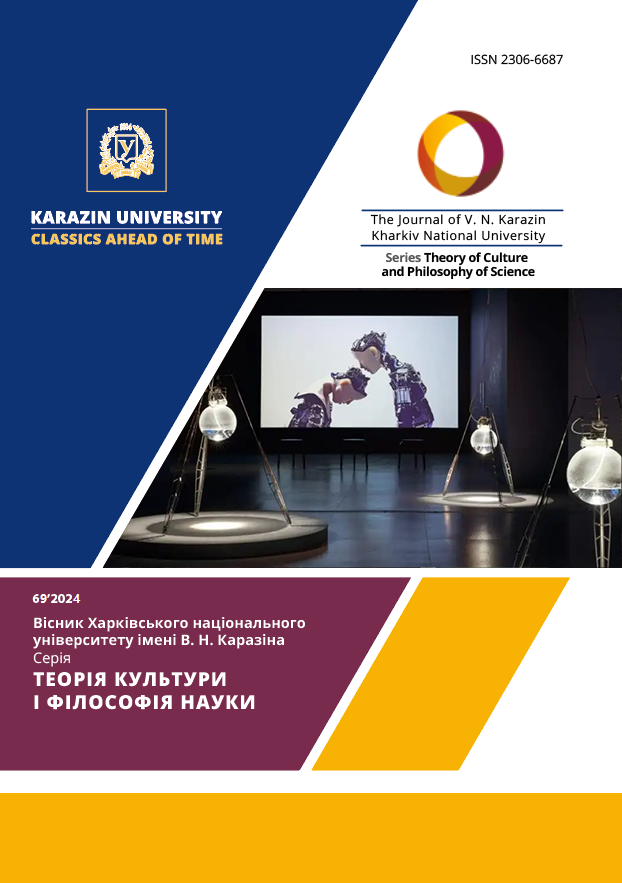THE INHIBITORY PROCESS OF MEMORY AND ITS INFLUENCE ON THE PRESERVATION OF SOCIO-CULTURAL ELEMENTS
Abstract
The article examines the so-called inhibitory process of memory as a type of active forgetting in the context of its use to preserve selected socio-cultural elements. At the first stage, the physiology of memory and the process of forgetting were revealed. The work of the inhibitory process of memory is analyzed as an example of active forgetting and passive forgetting caused by automatic processes, for example due to brain aging.
Next, the importance of the subjective value of information, which increases its strength in the memory structure, is noted, as well as the reasons why some information may be more important than others. To analyze such structures as memory, neurophysiological studies of the brain, as well as psychological understanding of memory, are taken.
Finally, examples of how the dominant culture "covers" the subject's memory in various ways through the inhibitory process of memory are explored. The examples are based on such significant historical events as the signing of the Valuev circular or the Holodomor, where the enemy actively used methods of spreading culture.
At the very end, it is considered under which conditions the dominant culture is resisted. This happens in moments of high stress, when the identity of the subject is threatened by something, which activates its memory, which consists, first of all, of everyday life, caused by a long line of cause-and-effect relationships from traditions, rituals, daily communications, etc. This kind of memory, despite its low intensity, occupies most of the information "encrypted" in the memory, and in times of stress, the subject turns to this kind of memory, which opposes the dominant, artificially implanted one.
Downloads
References
Boryak T. (2023) Information Warfare of the USSR (1945 – early 1980s): How Propaganda Turned Ukrainian Testimonies of Repressions and the 1932–1933 Famine into "Adventure Novels". Scientific Notes of Ostroh Academy National University. Series "Historical Sciences". Ostroh. Issue 34. P. 66–73. DOI: 10.25264/2409-6806-2023-34-66-73 (in Ukrainian)
Kolyadych, O. I., S. D. Mazur. (2021). Valuyev Circular 1863 as a Tool for the Destruction of the Ukrainian Language. Recommended for Publication by the Academic Council of "KROK" University of Economics and Law: 21 p. (in Ukrainian)
Culture During War. North • Ukraїner. Ukraїner. URL: https://www.ukrainer.net/kultura-i-viyna- pivnich/ (accessed: 03.02.2024). (in Ukrainian)
Levchenko, Yuri Ivanovich. (2023). Cultural Resistance – Component of Modern War: Overview of 2022. Cultural Almanac: P. 71-88. (in Ukrainian)
Ozhevan, Mykola Andriyovych. (2014) National Memory and Historical Traumas: Discourses of Winners and Losers. Strategic Priorities: P. 24-31. (in Ukrainian)
Proskurina O. (2007) Politico-Cultural Dimension of the Donbas Region / O. Proskurina // Political Management. - No. 1. - P. 127-135. (in Ukrainian)
Starovoyt S. V. (2021) Communist Propaganda in the Context of Total Collectivization and the Holodomor of 1932–1933. Ukrainian Peasant. Issue 25. Р. 102-110. doi:10.31651/2413-8142-2021- 25-Starovoit. (in Ukrainian)
Semen, Nataliya Fedorivna. (2019) Russian Internet Resources as a Factor in the Information Warfare Against Ukraine: Monograph. Diss. Dniprovsʹkyj nacionalʹnyj universytet im. O. Hončara. (in Ukrainian)
Sumchenko, Iryna. (2017) "Forgetting" and "Oblivion" as Phenomena of Culture. Doxa 2 (28). P. 64-74. (in Ukrainian)
Sukhorukova A. V. (2006) Influence of Mass Media on the Formation of Personality and Society's Spirituality. Culture of the Black Sea Peoples. No. 84. P. 78–82. (in Ukrainian)
Anderson, Michael C. (2005) The role of inhibitory control in forgetting unwanted memories: A consideration of three methods. Dynamic cognitive processes. P. 159-189.
Araújo, Maria Paula Nascimento, Myrian Sepulveda dos Santos. (2009). History, memory and forgetting: Political implications. RCCS Annual Review. A selection from the Portuguese journal Revista Crítica de Ciências Sociais. P. 1-18.
Bai, Heesoon. (1999). Decentering the Ego-self and Releasing the Care-consciousness. Philosophical Inquiry in Education. P. 7-17
Chiappe, Penny, Linda S. Siegel, Lynn Hasher. (2000) Working memory, inhibitory control, and reading disability. Memory & cognition 28. P. 8-17.
Davis, Ronald L., Yi Zhong. (2017) The biology of forgetting—a perspective. Neuron 95.3. P. 490-503.
Frankfurt, Harry. (1982) The importance of what we care about. Synthese. P. 257-272.
Hardt, Oliver, Karim Nader, Lynn Nadel. (2013) Decay happens: the role of active forgetting in memory. Trends in cognitive sciences 17.3, P. 111-120.
Megill, Allan. (1998) History, memory, identity. History of the human sciences. P. 37-62.
Shaver, Robert. (2002). Egoism. The Stanford Encyclopedia of Philosophy (Spring 2023 Edition), Edward N. Zalta & Uri Nodelman (eds.), URL: https://plato.stanford.edu/archives/spr2023/entries/egoism/
Shoemaker, Sydney S. (1959) Personal identity and memory. The Journal of Philosophy. P. 868-882.
Spiers, Hugo J., Daniel Bendor. (2014) Enhance, delete, incept: Manipulating hippocampus- dependent memories. Brain research bulletin. P. 2-7.




